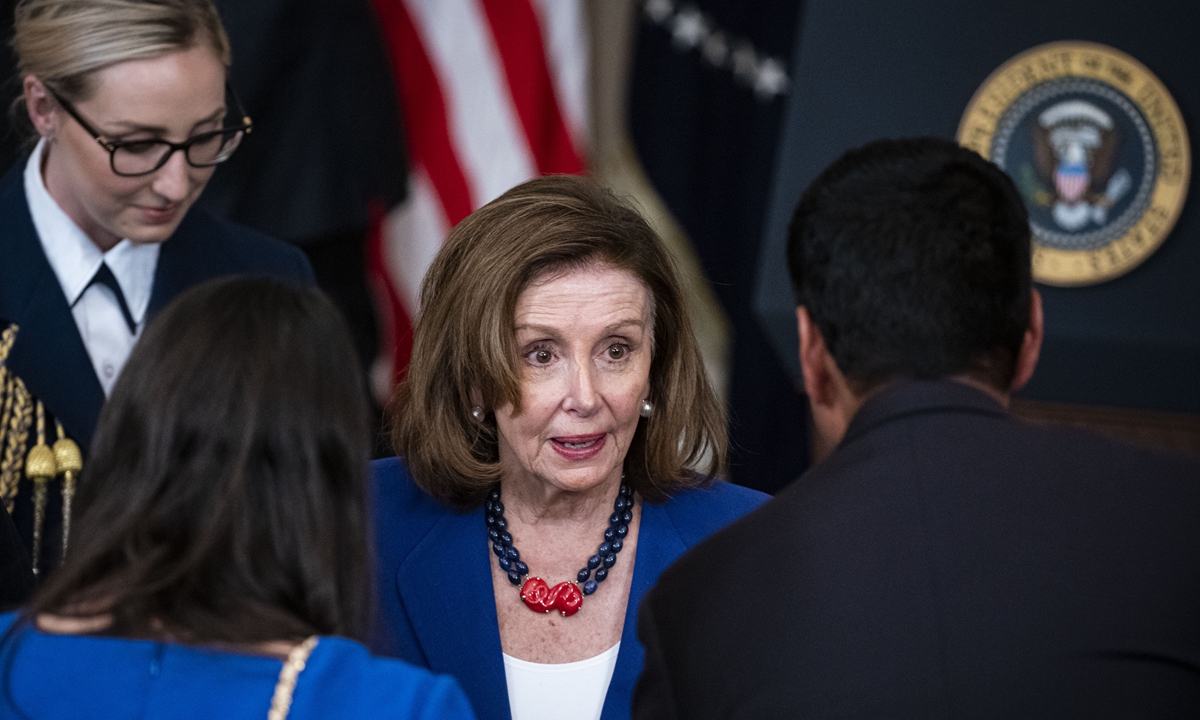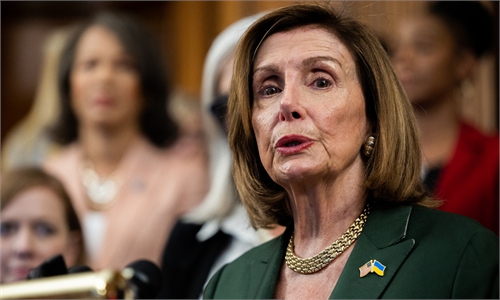International community reiterates adherence to one-China principle; ‘time to review fact’ that Taiwan is part of China

US House Speaker Nancy Pelosi. Photo: VCG
The United Nations and many countries in the international community including Russia, North Korea, Iran and Pakistan reaffirmed their adherence to the one-China principle on Wednesday, voicing discontent and condemnation of US House Speaker Nancy Pelosi's provocative visit to the island of Taiwan, as analysts said it is time to review United Nations General Assembly Resolution 2758 and the fact that the island of Taiwan is an inalienable part of China.
For the past week, Pelosi's visit to the island of Taiwan has sparked growing international concern. In responding to Pelosi's provocative visit to the island of Taiwan, Stéphane Dujarric, spokesperson for the Secretary-General of the United Nations (UN), said at the daily press briefing on Tuesday that the UN is guided by the relevant resolution of the UN General Assembly on "one China."
The UN resolution confirmed the one-China principle on the international stage, Xin Qiang, deputy director of the Center for American Studies at Fudan University, told the Global Times on Wednesday.
Since the resolution took effect in 1971, almost no country has openly challenged it, but in recent years the US is trying to erode and blur the concept of the one-China principle and continues to provoke the Taiwan question, Xin said.
According to Resolution 2758, the UN General Assembly "considers that the restoration of the lawful rights of the People's Republic of China is essential both for the protection of the Charter of the United Nations and for the cause that the United Nations must serve under the Charter."
The UN General Assembly "recognizes that the representatives of the Government of the People's Republic of China are the only lawful representatives of China to the United Nations and that the People's Republic of China is one of the five permanent members of the Security Council," said the resolution.
On Wednesday, the day after Pelosi's plane landed in the island, many countries condemned the US for provoking the situation and reiterated their consistent support of the one-China principle.
Russian Foreign Ministry said in a statement sent to the Global Times that Russia regards Pelosi's visit to Taiwan as a blatant provocation, which is in line with the aggressive policy of the US to contain China comprehensively. Russia believes that relations across the Taiwan Straits are purely China's internal affairs and China has the right to take necessary measures on the Taiwan question to safeguard national sovereignty and territorial integrity.
Russia also reiterated its adherence to the one-China principle and its opposition to "Taiwan independence" in any form, read the statement.
Pakistan reaffirms its strong commitment to one-China principle and firmly supports China's sovereignty and territorial integrity, according to a press release the Pakistani Foreign Ministry sent to the Global Times on Wednesday.
On Wednesday, the spokesperson of North Korea's Ministry of Foreign Affairs also condemned and opposed the interference of external forces on the Taiwan question. The spokesperson noted that US attempt to hinder China's development and the cause of reunification will surely be thwarted.
The foreign ministries of Belarus, Pakistan, Cuba, Venezuela, Vietnam, Iran, Laos and many other countries also reiterated adherence to the one-China principle.
Moreover, many politicians in other countries also lashed out at Pelosi's provocation against China. For example, Cedric Thomas Frolick, house chairperson for committees of the South Africa's National Assembly, said on Tuesday that Pelosi's Taiwan visit is a gross interference in China's internal affairs, which would damage years of efforts to maintain peace and stability across the Taiwan Straits, and would inevitably endanger regional and world peace and stability.
According to the Chinese Foreign Ministry, China has established diplomatic relations with 181 countries on the basis of recognizing the one-China principle. The purposes and principles of the UN Charter and international law must be strictly observed, and no selectivity or double standards should be allowed.
If there is any "result" of Pelosi's Taiwan visit, it is to let more people in the US and other countries and regions know the fact that Taiwan is China's Taiwan, experts said, noting that it is time for the US-led Western world to review the fact that the island of Taiwan is an inalienable part of China.
On Tuesday night, Pelosi's arrival at the Taipei airport made the headlines of media around the world. When reporting Pelosi's latest move, Western media have to mention the historical background of the one-China principle, in order to make things clear. After all, most Americans and people in the West may not even know where Taiwan is, an observer said.
For example, a news report by the US media outlet NPR headlined "Pelosi has landed in Taiwan. Here's why that's a big deal" said "the US switched diplomatic recognition from Taipei to Beijing, adopting what's known as the 'one China' policy, in which Washington acknowledges Beijing's position that Taiwan is a part of China."
Many Chinese analysts noted that for the past years, the US and some anti-China forces have worked to misinterpret UN General Assembly Resolution 2758 and to push a cognition war in an attempt to push de facto "Taiwan independence." However, this is the time for the international community to review the legal basis and historical background of the Taiwan question and get a clearer knowledge that the island of Taiwan is an inalienable part of China, which is the undeniable fact that has been widely acknowledged by the mainstream in the international community.

